De Italiaanse schrijfster Dacia Maraini werd geboren op 13 november 1936 in Fiesole. Zie ook alle tags voor Dacia Maraini op dit blog en ook mijn blog van 13 november 2009 en ook mijn blog van 13 november 2010.
Uit:Geraubte Liebe (Vertaald door Gudrun Jäger)
“Gianni Lenti, ein junger Arzt, sitzt auf einem Hocker in der Notaufnahme. In der Hand hält er einen Plastikbecher mit Kaffee, in seinen Ohren stecken Kopfhörer, aus denen eine sanfte, exotisch anmutende Musik dringt. Gerade lauscht er einer seiner Lieblingsstellen, sie erinnert ihn an die Bilder von Gauguin, die er vor Kurzem erst in einer Ausstellung gesehen hat. Barfüßige Frauen mit Blumen im Haar, im Hintergrund blaue Pferde, Palmen mit großen wogenden Blättern, die er
sich duftend und weich vorstellt.
Heute ist endlich einmal Zeit zum Durchatmen. Den ganzen Morgen über nur ein Schlaganfall. Zum Glück. Eigentlich könnte ich mir ein Eis holen, denkt er. Genau in dem Moment sieht er, wie sich die Glastür öffnet. Vor ihm steht ein junges Mädchen mit vorstehenden Wangenknochen und langen kas-
tanienbraunen Haaren, das nun schleppend näher tritt, mit einem offenkundig gebrochenen Arm.
»Vorbei mit der Ruhe«, murmelt er und geht ihr entgegen. Was zum Teufel ist denn mit der passiert. Als ob ein Lastwagen sie überfahren hätte. Überall blaue Flecken, und der Arm baumelt ihr einfach so an der Seite.
»Sie behauptet, sie wäre die Treppe runtergefallen«, sagt Ada, die Krankenschwester, gereizt. »Kümmerst du dich um sie?«
»Was denn für eine Treppe?«
»Keine Ahnung. Sie sagt nichts. Außerdem hat niemand so genau nachgefragt, wie der Sturz passiert ist. Eine Unterschrift, der übliche Papierkram, das war’s.«
Doktor Gianni Lenti betrachtet das junge Mädchen aufmerksam. Ihm ist, als hätte er sie schon einmal gesehen.
»Waren Sie nicht schon einmal hier in der Notaufnahme, mit zwei gebrochenen Rippen und Würgemalen am Hals?«
Marina Savina – so der Name, der auf dem Aufnahmeformular steht – schüttelt energisch den Kopf. Aber sie kann dem Blick des Arztes nicht standhalten, er scheint zu sagen: Natürlich bist du das, ich erkenne dich doch wieder.
»Was ist passiert?«, schaut er sie weiter forschend an.
»Ich bin die Treppe hinuntergefallen«, antwortet sie, allerdings kaum hörbar, bockig und mit gesenktem Blick.
»Selbst wenn du aus dem Fenster gesprungen wärst«, beharrt er. »Wer hat dir den Arm gebrochen?«
Keine Antwort.“

Dacia Maraini (Fiesole, 13 november 1936)
De Bengaalse schrijver Humayun Ahmed werd geboren op 13 november 1948 in Kutubpur in het toenmalige Oost-Pakistan, nu Bangladesh. Zie ook alle tags voor Humayun Ahmed op dit blog en ook mijn blog van 13 november 2010.
Uit: Love you all (Vertaald door Shafiqur Rahman)
‘S. Mathur was supposed to arrive almost one and a half hours ago’, said Sura, getting up from his chair. He had got an honorific red star as a result of his astonishing talent at a very early age. One of his inventions, named ‘parallel Existence’, had been continuously tested for three years. It would be not very long before ‘Parallel Existence’ would be universally accepted. All the scientists looked at Surra. He was trembling with anger. His white complexion was turning purple. He swept away the reddish hair which was falling over his forehead and said firmly, ‘I can’t understand how S. Mathur can delay one and a half hours when we are counting every minute.’ Surra shrugged his shoulders with dissatisfaction. He almost shouted, ‘S. Mathur should remember that this is a critical situation.’
The scientists stirred a little bit in their chairs. The situation was doubtless critical. Perhaps, it was already too late. Everything, this room, this round black table, the cool current of air was whispering, ‘Time is limited, it’s running out.’ The scared faces of the greatest scientists of the earth were reflected on the black walls of the room. They were sitting silently their chests constricted with worry.
From time to time there are defining moments in history – very special moments, when great scientists are born who change the theories and beliefs of the age. These geniuses do not just upgrade knowledge, in the usual way, step by step, but take it onto an impossibly higher plain. These great men, as powerful as God, are born only once or twice every thousand years. These are the times when the golden age of science and technology begins to fulfill the original desire of human beings: to control every seen and unseen thing in the universe, leaving nothing undiscovered, nothing unknown, nothing mysterious.
The age we are talking about was the age dominated by scientists. Old theories and ideas were being blown away as in a storm. The mysterious problems which had not been solved for hundreds of years, – problems which had been helplessly laid on one side by previous scientists – were not only unravelled but also supplanted by new theories.”
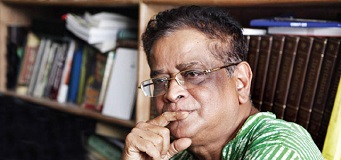
Humayun Ahmed (Kutubpur, 13 november 1948)
De Amerikaanse schrijver William Gibson werd geboren op 13 november 1914 in New York. Zie ook alle tags voor William Gibson op dit blog en ook mijn blog van 13 november 2010.
Uit: Dinny and the Witches
This is How the World was Made (song)
This is how the world was made,
In a stew, in a stew,
Toil and time and things decayed,
Spit and glue, spit and glue,
A pinch of malice a pinch of man,
Cook forever without a plan,
This is how the world began:
Stir the brew, stir the brew.
This is how a man is mixed,
In a stew, in a stew,
Toadstool heart and twenty sticks,
Spice with rue, spice with rue,
A cup of love a bill unpaid,
A dash of soul a key mislaid,
A grain of wit, a hand grenade,
Make the brew, make the brew.
This is how the world goes round,
In a stew, in a stew,
Tear of angel tooth of hound,
Me and you, me and you:
Sailors drown in a city puddle,
Lovers part and killers cuddle
Man, and mud, and mind, an muddle:
Drink the brew.
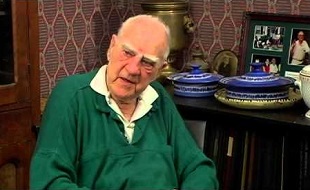
William Gibson (13 november 1914 – 25 november 2008)
De Frans-Canadese dichter en politicus Gérald Godin werd geboren op 13 november 1938 in Trois-Rivières, Quebec. Zie ook alle tags voor Gérald Godin op dit blogen ook mijn blog van 13 november 2009 en ook mijn blog van 13 november 2010.
Libertés” – Libertés surveillées
Quand les bulldozers d’Octobre entraient dans les maisons
à cinq heures du matin
Quand les défenseurs des Droits de l’Homme
étaient assis sur les genoux de la police
à cinq heures du matin
Quand les colombes portaient fusil en bandoulière
à cinq heures du matin
Quand on demande à la liberté de montrer ses papiers
à cinq heures du matin
il y avaient ceux qui pleuraient en silence
dans un coin de leur cellule
il y avait ceux qui se ruaient sur les barreaux
et que les gardiens traitaient de drogués
il y avait ceux qui hurlaient de peur la nuit
il y avait ceux qui jeûnaient depuis le début
Quand on fait trébucher la Justice
dans les maisons pas chauffées
à cinq heures du matin
Quand la raison d’état se met en marche
à cinq heures du matin
il y en a qui sont devenus cicatrices
à cinq heures du matin
il y en a qui sont devenus frisson
à cinq heures du matin
il y a ceux qui ont oublié
il y a ceux qui serrent encore les dents
il y a ceux qui s’en sacrent
il y a ceux qui veulent tuer

Gérald Godin (13 november 1938 – 12 okrober 1994)
Tentoonstelling over de Gérald Godinin Quebec, 2013
De Duitse schrijver en kunstenaar Karl Jakob Hirsch werd op 13. November 1892 in Hannover geboren. Zie ook alle tags Karl Jakob Hirsch op dit blog en ook mijn blog van 13 november 2010.
Karl Jakob Hursch: Gekreuzigter
Uit: Quintessenz meines Lebens
“Aber allmählich mußte ich einsehen, daß meine Kraft nicht ausreichte, gegen die Konflikte und
politischen Manöver , die sich in der Westzone Deutschlands abspielten, anzugehen. Ich war da
malsnoch naiv, das sehe ich heute, ich versuchte noch, gutgläubig wie ich war, mit meinen reinsten und entschiedenen Anti-Nazi-Gefühlen Kunst zu machen. Es mißlang. […] Heute weiß es jeder, […] daß es in der westlichen Welt einen Zwang und eine Gewalt gibt, die mit dem Worte ‘Diktatur des Kapitals’ zu schwach gekennzeichnet ist. […] Mir wurde es von Tag zu Tag klarer, daß ein links
gerichteter oder gar sozialistischer Emigrant eine Erscheinung war, die man in keiner Weise wünschte. Natürlich bewahrte man nach außen hin die Formen einer Demokratie, aber es war sehr un
verbindlich.“
(…)
„Es sind genau jene Leute, die es damals von 1932 [lies: vor 1932/33; der Verf.] in so er schreckender Zahl in Deutschland gegeben hat, die sogenannten ‘Unpolitischen’, denen alles gleichgültig war, nur das nicht, daß die damalige Weimarer Republik zu weit … nach links rutschte. […] Ich verlernte das Staunen und wußte vor allem nicht recht, was denn eigentlich die Menschen in Deutschland aus den Erfahrungen der Schreckensjahre von 1933 bis 1945 gelernt hatten. Ich weiß es wohl heute: Sie haben nichts gelernt. Gar nichts.“
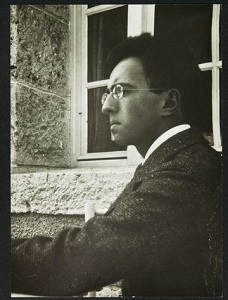
Karl Jakob Hirsch (13. November 1892 – 8. Juli 1952)
De Schotse schrijver Robert Louis Stevenson werd geboren in het Schotse Edinburgh op 13 november 1850. Zie ook alle tags voor Robert Louis Stevenson op dit blog.
Uit: The Strange Case of Dr Jekyll and Mr Hyde
It chanced on one of these rambles that their way led them down a by-street in a busy quarter of London. The street was small and what is called quiet, but it drove a thriving trade on the week-days. The inhabitants were all doing well, it seemed, and all emulously hoping to do better still, and laying out the surplus of their gains in coquetry; so that the shop fronts stood along that thoroughfare with an air of invitation, like rows of smiling saleswomen. Even on Sunday, when it veiled its more florid charms and lay comparatively empty of passage, the street shone out in contrast to its dingy neighbourhood, like a fire in a forest; and with its freshly painted shutters, well-polished brasses, and general cleanliness and gaiety of note, instantly caught and pleased the eye of the passenger.
Two doors from one corner, on the left hand going east, the line was broken by the entry of a court; and just at that point, a certain sinister block of building thrust forward its gable on the street. It was two stories high; showed no window, nothing but a door on the lower story and a blind forehead of discoloured wall on the upper; and bore in every feature, the marks of prolonged and sordid negligence. The door, which was equipped with neither bell nor knocker, was blistered and distained. Tramps slouched into the recess and struck matches on the panels; children kept shop upon the steps; the schoolboy had tried his knife on the mouldings; and for close on a generation, no one had appeared to drive away these random visitors or to repair their ravages.
Mr. Enfield and the lawyer were on the other side of the by-street; but when they came abreast of the entry, the former lifted up his cane and pointed.
“Did you ever remark that door?” he asked; and when his companion had replied in the affirmative, “It is connected in my mind,” added he, “with a very odd story.”
“Indeed?” said Mr. Utterson, with a slight change of voice, “and what was that?”
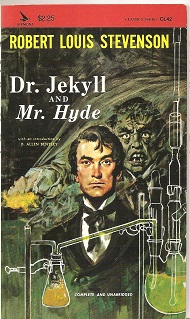
Robert Louis Stevenson (13 november 1850 – 3 december 1894)
Cover
De Zweedse dichter Esaias Tegnér werd geboren op 13 november 1782 in Kyrkerud. Zie ook alle tags voor Esaias Tegnér op dit blogen ook mijn blog van 13 november 2010.
Uit: Fridthjof’s Saga (Fragment)
Spring is coming, birds are twittering, forests leaf, and smiles the sun,
And the loosened torrents downward, singing, to the ocean run;
Glowing like the cheek of Freya, peeping rosebuds ‘gin to ope,
And in human hearts awaken love of life, and joy, and hope.
Now will hunt the ancient monarch, and the queen shall join the sport:
Swarming in its gorgeous splendor, is assembled all the Court;
Bows ring loud, and quivers rattle, stallions paw the ground alway,
And, with hoods upon their eyelids, scream the falcons for their prey.
See, the Queen of the Chase advances! Frithiof, gaze not at the sight!
Like a star upon a spring-cloud sits she on her palfrey white.
Half of Freya, half of Rota, yet more beauteous than these two,
And from her light hat of purple wave aloft the feathers blue.
Gaze not at her eyes’ blue heaven, gaze not at her golden hair!
Oh beware! her waist is slender, full her bosom is, beware!
Look not at the rose and lily on her cheek that shifting play,
List not to the voice beloved, whispering like the wind of May.
Now the huntsman’s band is ready. Hurrah! over hill and dale!
Horns ring, and the hawks right upward to the hall of Odin sail.
All the dwellers in the forest seek in fear their cavern homes,
But, with spear outstretched before her, after them the Valkyr comes.
. . . . . . . . . .
Then threw Frithiof down his mantle, and upon the greensward spread,
And the ancient king so trustful laid on Frithiof’s knee his head,
Slept as calmly as the hero sleepeth, after war’s alarm,
On his shield, or as an infant sleeps upon its mother’s arm.
As he slumbers, hark! there sings a coal-black bird upon the bough;
‘Hasten, Frithiof, slay the old man, end your quarrel at a blow:
Take his queen, for she is thine, and once the bridal kiss she gave,
Now no human eye beholds thee, deep and silent is the grave,’
Frithiof listens; hark! there sings a snow-white bird upon the bough:
‘Though no human eye beholds thee, Odin’s eye beholds thee now.
Coward! wilt thou murder sleep, and a defenceless old man slay!
Whatsoe’er thou winn’st, thou canst not win a hero’s fame this way.
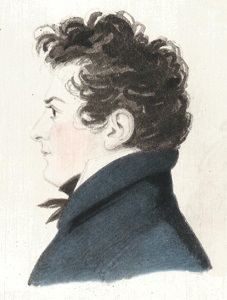
Esaias Tegnér (13 november 1782 – 2 november 1846)
Portret door Leonard Roos af Hjelmsäter, jaren 1820
